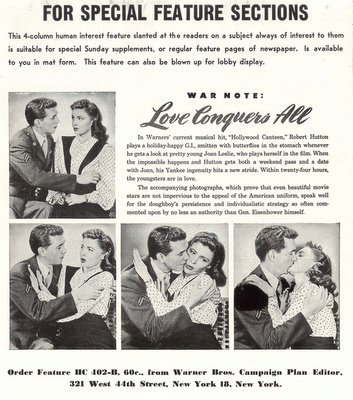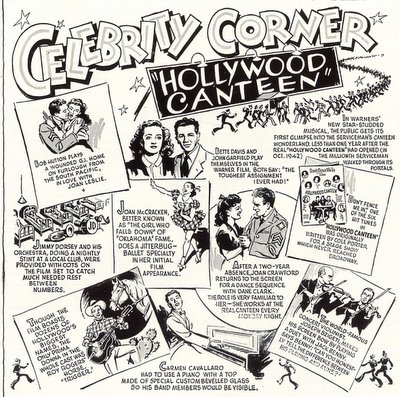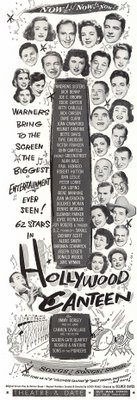

Hollywood Canteen Fact and Fiction

Just got out the old laser disc of Hollywood Canteen and looked at it again. First of all, I found myself fast-forwarding through most of Dane Clark’s scenes. Is this dude obnoxious or what? Did servicemen from Brooklyn behave like this in wartime? Even Bill Bendix over at Paramount was less irritating than this guy, though George Tobias does run Dane a close second as a tiresome Brooklyn shtick character. Still, we love Hollywood Canteen. When it’s good, there’s nothing better. The air of total unreality is off to a good start when we open on the G.I.s catching a 35mm (!) screening of The Hard Way in a jungle clearing. The boys are quietly reverent when they see girl-next-door Joan Leslie (yes, her again) on the screen --- not like actual camp screenings where the soldiers were often as not hurling profanity-laced epithets toward the players and giving the horse-laugh to all the phony heroics being staged (at one such unspooling of So Proudly We Hail, Veronica Lake packs a grenade into her shirt and walks into a group of Japanese soldiers, blowing the whole crowd, including herself, to smithereens -- it was at this point that one wag in the audience yelled, “Hey! I know which part I want!”). Anyway, "Slim" (nicely played by comparative newcomer Robert Hutton) falls for Joan, and from there it’s off to Hollywood for Bob and drag-the-picture-down-like-an-anchor pal Clark, both of whom have received the kind of battle wounds that only involve a sling and/or a slight limp, but don’t really hurt or anything. Immediately upon arriving at the Canteen, Bob unburdens himself to that ultimate purveyor of show-biz brash, Jack Carson, confessing his love for Joan with a line that, if nothing else, reveals his appalling naivete. “I feel that she’s really just like the girls back home at heart”. Jack right away lets good pal Bette Davis in on the secret, and this is where one of the essential absurdities of Hollywood Canteen begins to reveal itself. First off, all the stars are presented as one big joshing fraternity, everyone on a first-name basis. Since they’re all Warner players conscripted to be in this movie, that may not be too much of an exaggeration, but it raised the question in my mind --- Just how well did movie stars of that day know each other? Obviously, a lot of them worked together, but what about the rest? I remember reading that when they told Clark Gable that his Soldier Of Fortune leading lady would be Susan Hayward, he’d never even heard of the woman, and this was 1955, years after she’d first made her splash. And speaking of Jack Carson, have you seen that kinescoped opening-night footage from the 1954 A Star Is Born premiere? It’s fantastic stuff, and there’s a moment when Donald Crisp is greeted by Master Of Ceremonies Jack with “Hiya, Donald, haven’t seen you since Bright Leaf!” It’s a great candid moment.


 The story goes that Ann Sheridan was approached to play herself in Hollywood Canteen, that is to play what became the Joan Leslie part. Sheridan loudly declared that the whole idea of a movie star entering into a successful romantic relationship with a soldier was utter nonsense, and that she would never participate in such a lie. Now, if any of this is true, you’ve really got to hand it to Annie, because the love story presented here, between lonely soldier Robert Hutton and supposed real-life “Joan Leslie”, is so patently false, so utterly outlandish in every detail, that it’s no wonder audiences began to turn away from the movies not long after the war ended. To begin with, “Joan Leslie” (who was nineteen when this picture was made) is still living at home with her parents and a sister (played by Joan’s real-life sibling). The father is standard- issue patriarch Jonathan Hale, and it’s clearly indicated that he’s master of the house, even though we know it’s Joan who’s bringing in the major bucks (if anyone working at Warners could be said to have done that). There’s even a scene where mother and father go in to prepare the evening meal for guest Robert Hutton, saying that for this special occasion, “We’ll give Joan the night off”. Respect for elders is the order of the day, even when you’ve hit it big in movies. The dishonesty is further compounded when Joan hesitates to invite Bob in after she discovers her parents have gone to the movies. “I don’t think they’d like it very well if they came home and found just the two of us in the house”, she says. Talk about pandering to good old-fashioned Middle American family values! If Joan Leslie really lived like this during her years of stardom, I’ll eat my hat. The topper to all this absurdity is a train station farewell where Joan pledges that she’ll wait for Bob, just like Jennifer Jones promised her Bob in Since You Went Away. The whole ridiculous conceit might almost work if she were playing a fictional movie star, but this is Joan Leslie playing herself, and asking the audience to buy a finish like this is plain breathtaking in it’s audacity. That, of course, is only part of what makes this movie such a delight ---
The story goes that Ann Sheridan was approached to play herself in Hollywood Canteen, that is to play what became the Joan Leslie part. Sheridan loudly declared that the whole idea of a movie star entering into a successful romantic relationship with a soldier was utter nonsense, and that she would never participate in such a lie. Now, if any of this is true, you’ve really got to hand it to Annie, because the love story presented here, between lonely soldier Robert Hutton and supposed real-life “Joan Leslie”, is so patently false, so utterly outlandish in every detail, that it’s no wonder audiences began to turn away from the movies not long after the war ended. To begin with, “Joan Leslie” (who was nineteen when this picture was made) is still living at home with her parents and a sister (played by Joan’s real-life sibling). The father is standard- issue patriarch Jonathan Hale, and it’s clearly indicated that he’s master of the house, even though we know it’s Joan who’s bringing in the major bucks (if anyone working at Warners could be said to have done that). There’s even a scene where mother and father go in to prepare the evening meal for guest Robert Hutton, saying that for this special occasion, “We’ll give Joan the night off”. Respect for elders is the order of the day, even when you’ve hit it big in movies. The dishonesty is further compounded when Joan hesitates to invite Bob in after she discovers her parents have gone to the movies. “I don’t think they’d like it very well if they came home and found just the two of us in the house”, she says. Talk about pandering to good old-fashioned Middle American family values! If Joan Leslie really lived like this during her years of stardom, I’ll eat my hat. The topper to all this absurdity is a train station farewell where Joan pledges that she’ll wait for Bob, just like Jennifer Jones promised her Bob in Since You Went Away. The whole ridiculous conceit might almost work if she were playing a fictional movie star, but this is Joan Leslie playing herself, and asking the audience to buy a finish like this is plain breathtaking in it’s audacity. That, of course, is only part of what makes this movie such a delight ---
The pressbook ad shown here will give you an idea of the cast --- those that got billing, that is. Others to be glimpsed include Diana Barrymore, Robert Shayne, Julie Bishop, John Dehner, Dick Erdman, James Flavin, Dorothy Malone, Mark Stevens, Ray Teal, and many more. The “Love Conquers All” feature is a misrepresentation of what actually happens in the movie, and you can’t help wondering how much false hope was raised among servicemen when they saw the “photographs which prove that even beautiful movie stars are not impervious to the American uniform”. We won’t comment on the “doughboy’s persistence” and “individualistic strategy” beyond speculating that all of this must have caused a good deal of hardship among actresses trying to get through their shifts at the real Hollywood Canteen. The mention of Bette Davis and her “toughest assignment” was actually on the level, as we understand B.D. found it near impossible to play herself on film. Maybe by 1944, she’d forgotten who the real Bette Davis even was. There's also a shot of forlorn Joan Crawford making the best of a bad situation as she waits for Mildred Pierce, and the resumption of her stardom, to roll around. She’s about the only big name in Hollywood Canteen who never interacts with other big names. This was her first appearance in a Warner Bros. picture. Of course, the whole story is built around the gimmick of Robert Hutton being the "millionth man" to walk through the doors of the Canteen. For the sake of accuracy, we've dug up the still at the top to show you the real millionth man, First Sgt. E.W.Bell of Rising Star, Texas, who just happened to have received a Purple Heart in the South Pacific (folks, just between us, I think this whole thing was rigged). His reception committee includes Lana Turner, Deanna Durbin, and Marlene Dietrich. I do wonder if this veteran might still be with us. Anybody know him?